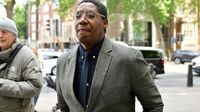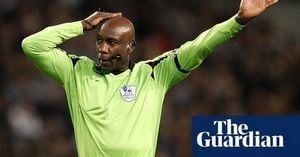Oghenochuko Ojiri, a 53-year-old antiques expert known for his appearances on the BBC’s Bargain Hunt, has pleaded guilty to multiple charges linked to terrorist financing. His case marks a significant development in the art world, as he is the first individual charged under section 21A of the Terrorism Act 2000. This groundbreaking legal action stems from an investigation by the Metropolitan Police's National Terrorist Financial Investigation Unit (NTFIU), which uncovered a series of high-value art sales that Ojiri failed to disclose.
Ojiri faced eight counts of failing to make a disclosure during the course of business in the regulated sector, according to the Metropolitan Police. The offences allegedly occurred between October 2020 and December 2021, during which Ojiri sold artwork valued at approximately £140,000 to Nazem Ahmed, a man identified by U.S. authorities as a suspected financier for the militant group Hezbollah.
During a hearing at Westminster Magistrates’ Court on May 9, 2025, Ojiri admitted to the charges. Prosecutor Lyndon Harris detailed how Ojiri was aware of Ahmed's designation and had engaged in discussions about it prior to the transactions. “At the time of the transactions, Mr. Ojiri knew Mr. Ahmed had been sanctioned in the U.S.,” Harris stated, emphasizing Ojiri's direct involvement in negotiating the sales and celebrating their completion.
The court heard that the artwork sold was not merely a facade for illicit activities; it was shipped to locations such as Dubai and Beirut, which raised red flags about potential money laundering. The introduction of new money laundering regulations in January 2020, which brought the art market under the supervision of HMRC, was also a crucial factor in the case. Ojiri had reportedly discussed these changes with colleagues, indicating his awareness of the legal landscape.
Following his guilty plea, Ojiri was granted bail under the condition that he surrender his passport, with sentencing scheduled for June 6, 2025, at the Old Bailey. The maximum penalty for such offences could reach five years in prison, reflecting the seriousness of the charges.
Ojiri's career has spanned various roles in the art world, including his work as a freelance presenter on the BBC. He is also known for his previous ownership of an art gallery called Pelicans & Parrots, which specialized in contemporary art and furniture, and his involvement in the Ramp Gallery, which promotes emerging artists. Despite his legal troubles, Ojiri has expressed a deep passion for contemporary art, describing himself as “absolutely obsessed, in love and infatuated.”
The BBC has stated that it would not be appropriate to comment on the ongoing legal proceedings involving Ojiri. Notably, he has not appeared on any BBC programmes since 2023, raising questions about the future of his career in television.
This case underscores the increasing scrutiny of the art market in relation to financial regulations and terrorist financing. As authorities step up their efforts to regulate the sector, incidents like Ojiri's highlight the potential for misuse within a field often perceived as unregulated. The collaboration between various governmental agencies, including the Treasury and HMRC, reflects a broader commitment to tackling financial crime in the arts.
Ojiri's situation serves as a cautionary tale for others in the industry, emphasizing the importance of transparency and adherence to legal obligations. As the art market continues to evolve, the implications of this case may resonate beyond the courtroom, influencing how art dealers and collectors approach their transactions.
In light of these developments, the art community is left to ponder the balance between creativity and compliance. As investigations into financial misconduct become more prevalent, participants in the art world must navigate an increasingly complex regulatory environment.
As Ojiri awaits sentencing, the ramifications of his actions will likely reverberate throughout the art community, prompting discussions about ethics, accountability, and the responsibilities of art dealers in ensuring that their sales do not inadvertently support illegal activities. The outcome of this case may set a precedent for future investigations and prosecutions in the art market, making it a pivotal moment in the intersection of art and law.





